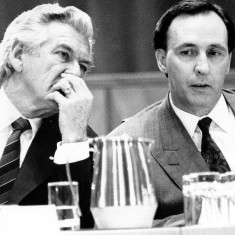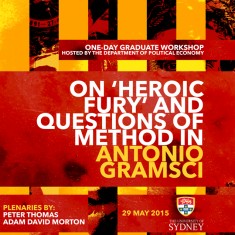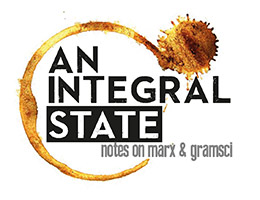Latest Blog Posts
-

Why didn’t neoliberalism start during the Fraser Government
Many people associate the beginning of neoliberalism with the election of conservative governments influenced by the New Right and theorists such as Friedrich Hayek and Milton Friedman. A useful question to ask, then, is why didn’t the vanguard neoliberal period commence during Australia’s conservative Liberal government (1975-1983) led by Prime Minister Malcolm Fraser? One explanation […]
-

Travels with Gramsci
This post was first published at Progress in Political Economy, the blog of the Department of Political Economy at the University of Sydney. Click here for the audio of my talk on Soundcloud. *** Some paths to an event seem particularly labyrinthine, which only adds to the joy once a project reaches an unexpected destination. […]
-

Historical Materialism 2015, Sydney, Call for Papers
The call for papers for Historical Materialism Australasia, to be held in Sydney on 17 & 18 July 2015, has just been released. Abstracts are due by 15 May. I’m particularly excited as Raewyn Connell and Terry Irving will both be speaking, as part of a series of discussions marking the 35th anniversary of the publication of their seminal […]
-

Neoliberalism and the Accord: 3CR podcast
The 14th Biennial National Labour History Conference, ‘Fighting Against War: Peace Activism in the Twentieth Century’ was held at Queen’s College, University of Melbourne, 11-13 February 2015. My paper on ‘The Accord after Thirty Years: Corporatism in the Neoliberal Era‘ was recorded by the Solidarity Breakfast program on 3CR, who featured excerpts from it as a part […]
-

Anti-politics and the illusions of neoliberalism
We live in anti-political times. After a twentieth century in which Western societies experienced the rise and entrenchment of mass representative institutions, where hundreds of millions of people accepted that politics was the main way to have their social interests advanced, these arrangements have ever more obviously fallen into disrepair, decay and even frank breakdown. […]
-

Call for papers: Gramsci workshop for research students
I am currently helping to organise a graduate workshop at the University of Sydney, exploring the work of Antonio Gramsci. All research students, whether based in Australia or overseas, are welcome to submit an abstract for a paper. The call for papers follows below. On ‘heroic fury’ and questions of method in Antonio Gramsci FRIDAY […]
-

Anti-politics, movements & the practical critique of the state
In November I co-organised (with Tad Tietze) a panel discussion on ‘Anti-politics, social movements & the practical critique of the state’ at the London Historical Materialism Journal conference. It featured three papers (abstracts below) and you can hear the audio of them at Left Flank. Our sincere thanks go to the conference organisers and to the critical but enthusiastic people […]
-

Klein’s ‘shock doctrine’ thesis & the Whitlam dismissal
Naomi Klein’s The Shock Doctrine (2007) is one of the most widely read critical accounts of neoliberalism. Klein argues that governments have used ‘disasters’ of various kinds to implement neoliberal policies. Transformation occurs through ‘eventful temporality’, where moments of ‘coups, crisis, and shocks…usher in neoliberal policies’ transforming ‘existing modes of public administration and resource allocation’ […]
-

Neoliberalism’s Dominant Narrative
Use of the term ‘neoliberalism’ is widespread in the social sciences. While debates have raged since the 2008 economic crisis as to whether neoliberalism persists or has faltered, many argue it remains ‘the mode of existence of contemporary capitalism’ (Saad-Filho 2010, 242). Use of the term has, however, often obscured its meaning. For example, many […]
